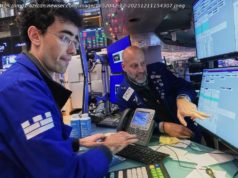The S&P 500 fell 11.90 points, or 0.4 percent, to 2,755.88. The index is on course for its worst month in more than three years.
Banks led a broad slide in U. S. stocks Monday as an early rally faded, giving the benchmark S&P 500 index its fourth straight loss.
Health care and energy stocks also helped pull the market lower, outweighing gains by technology and consumer-focused stocks. Crude oil prices eked out a small gain after spending most of the day in the red.
The latest losses came as traders geared up for a busy week of company earnings reports that should help answer how Corporate America is coping with rising interest rates, inflation and the impact of global trade disputes.
“The earnings results have the potential to stabilize the market, but what investors are really keen on hearing from companies is what the sustainability of the earnings outlook is, especially in light of the concerns of the potential impact from tariffs,” said Laura Kane, head of Investment Themes Americas at UBS Wealth Management Research.
The S&P 500 fell 11.90 points, or 0.4 percent, to 2,755.88. The index is on course for its worst month in more than three years. The Dow Jones Industrial Average lost 126.93 points, or 0.5 percent, to 25,317.41. The tech-heavy Nasdaq recovered from an early tumble, gaining 19.60 points, or 0.3 percent, to 7,468.63.
The Russell 2000 index of smaller-company stocks gave up 2.54 points, or 0.2 percent, to 1,539.50. That’s the lowest close for the index since April. It’s now up just 0.3 percent for the year.
Decliners outnumbered gainers on the New York Stock Exchange.
Major U. S. stock indexes initially headed higher early Monday, riding a strong wave of buying in Chinese markets as traders brushed off potential concerns about slower growth in the world’s second-biggest economy and a downgrade in Italy’s credit rating.
That early rally vanished after a few minutes, however, as trading turned volatile. At its extremes, the Dow swung from a gain of more than 100 points to a loss of more than 200.
“In this pullback, the defensive sectors have held in there better than these more cyclical sectors,” said Scott Wren, senior global equity strategist at Wells Fargo Investment Institute.
Investors have been worried in recent weeks about potential threats to corporate growth, including rising interest rates, trade tensions between the U. S. and China, and some sluggish reports about housing construction and sales.
This week marks the busiest stretch of the quarterly earnings calendar as many big-name companies report their latest results, including Caterpillar, Amazon and Google’s parent company, Alphabet.
Nearly 17 percent of companies in the S&P 500 had served up third-quarter results as of Monday. Of those, 54 percent delivered earnings and revenue that topped Wall Street’s forecasts, according to S&P Global Market Intelligence.
Financial and industrial companies account for most of the S&P 500 companies that have reported results so far this earnings season.
Investors are most focused on what companies have to say about what impact, if any, the U. S.-China trade dispute, a stronger dollar and rising interest rates, which can drive up the cost of borrowing and carrying debt, are likely to have in 2019.
“Everybody’s trying to get a fix on what 2019 earnings are going to be, because they’re sure as heck not going to be what earnings growth was this year, and we all know that,” Wren said. “You’re not going to have a big tax-induced sugar high like you’re having this year.”
So far, most companies have said that they expect minimal impact from the hundreds of billions in tariffs that the U. S. and China have imposed or on each other, “though some have taken a more negative tone about what lies ahead,” according to a research note published Monday by RBC Capital Markets.
The key concerns cited by companies that issued quarterly results so far this earnings season are higher labor costs, and the price of commodities, transportation and shipping, among others.
Banks and other financial companies took the heaviest losses Monday. Synchrony Financial fell 6 percent to $29.47.
Energy stocks also fell as the price of crude oil spent most of the day lower. Newfield Exploration fell 3 percent to $22.91.
After a sluggish start, technology stocks rebounded in morning trading. Advanced Micro Devices climbed 5.8 percent to $25.03.
Hasbro slid 3.1 percent to $95.01 after the toy maker reported disappointing third-quarter results, partly due to lost sales following the demise of Toys R Us. Hasbro also said it will cut jobs as it deals with the effects of Toys R Us bankruptcy. Rival Mattel also declined, shedding 0.8 percent to $14.10.
Traders hammered Bristol-Myers Squibb after the drugmaker said regulators want three more months to review data from a potential lung cancer treatment regimen. The stock skidded 6.3 percent to $50.88.
Bond prices didn’t move much. The yield on the 10-year Treasury held steady at 3.19 percent.
Benchmark U. S. crude recovered from an early skid. It gained 0.1 percent to settle at $69.17 per barrel in New York. Brent crude, used to price international oils, added 0.1 percent to close at $79.83 per barrel in London.
Wholesale gasoline fell 0.4 percent to $1.91 a gallon. Heating oil rose 0.7 percent to $2.32 a gallon. Natural gas slid 3.4 percent to $3.14 per 1,000 cubic feet.
Gold dipped 0.3 percent to $1,224.60 an ounce. Silver fell 0.4 percent to $14.59 an ounce. Copper gained 0.3 percent to $2.79 a pound.
The dollar strengthened to 112.82 yen from 112.60 yen on Friday. The euro fell to $1.1466 from $1.1510.
Major stock indexes in Europe also gave up early gains Monday. Germany’s DAX slipped 0.3 percent and France’s CAC-40 lost 0.6 percent. Britain’s FTSE 100 fell 0.1 percent.
In Asia, the Hang Seng in Hong Kong surged 2.3 percent, while Japan’s Nikkei 225 index reversed early losses, gaining 0.4 percent. The Kospi in South Korea added 0.3 percent. Australia’s S&P-ASX 200 countered the trend, shedding 0.6 percent. Shares rose in Taiwan, Singapore and Indonesia, but fell in Thailand.






